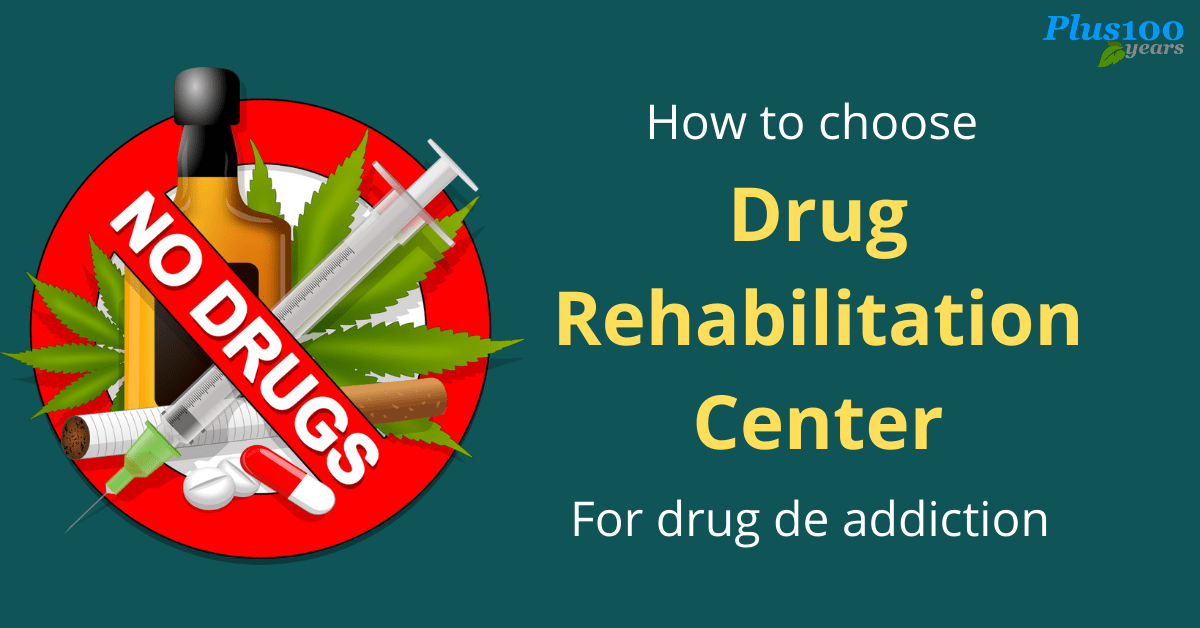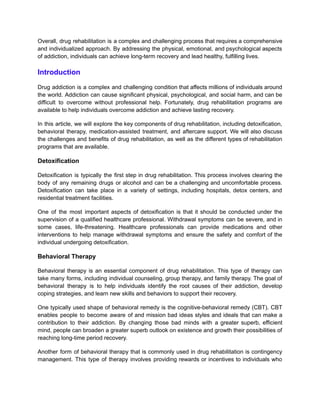5 Simple Techniques For Drug Rehabilitation
5 Simple Techniques For Drug Rehabilitation
Blog Article
Some Known Details About Drug Rehabilitation
Table of ContentsThe Ultimate Guide To Drug RehabilitationRumored Buzz on Drug RehabilitationThe Drug Rehabilitation StatementsAbout Drug RehabilitationDrug Rehabilitation Fundamentals Explained
This involves addressing the entire person to make sure that all of the underlying causes and effects of the dependency are correctly taken care of and dealt with. This gives individuals the tools they require for a complete go back to a happy, healthy, substance-free life. Medication dependency "treatment" is a little bit of a misleading term it suggests that people with addictions are "all better" after they have actually gotten some type of treatment.Also individuals with years of successful recovery have to stay mindful of their capacity for regression, and they have to make use of the tools they learned in treatment to stop it. The word "rehab" also indicates that someone is being fixed after misbehaving, which is constant with culture's preconception concerning addiction. Drug Rehabilitation. Component of the recovery procedure is for people with dependencies, and their family members, to find out that dependency is a matter of biology and not morality
Besides, transitioning from physical and mental addiction to a healthy and pleased way of living is a huge change. It is very important that the steps to medicine recovery be properly addressed throughout the medication rehab procedure. There are four phases of addiction recuperation: Dependency analysis is a particularly crucial part of the rehabilitation process.
This becomes part of the underlying psychology of addiction, and it strengthened by fears of apprehension for belongings and judgment from household and good friends. The assessment procedure needs gaining trust fund and breaking through that secretive nature. The individual demands to determine which compounds were used and the extent of their material use.
The 5-Minute Rule for Drug Rehabilitation

For lots of people with addictions, worry of withdrawal is a significant obstacle to leaving their addiction, which anxiety maintains them from also attempting. Luckily, withdrawal and medication detoxification do not need to be a terrible experience. By taking part in a clinical detox program, people can obtain through the experience safely and conveniently.
This is where the underlying causes of addiction are dealt with. For most individuals with substance addiction, their substance use is no more concerning getting you can find out more high. Instead, it came to be a recurring, day-to-day procedure of avoiding withdrawal signs and symptoms and escaping from their truth. Drug rehab is the process where the deep concerns around the addiction are recognized and addressed.
The 9-Minute Rule for Drug Rehabilitation
Rather, it can be stated that rehabilitation is the procedure of discovery, while what takes place afterward is healing. The addicted mind commonly begins to believe specifically after an amount of time in abstinence that it is OK to try alcohol consumption or utilizing substances again. However, this rarely functions, and the substantial majority of individuals that try drinking or utilizing medicines once again will promptly wind up where they were previously.

Sober living residences are a specifically reliable strategy to aftercare when a person is discharged from rehab. Individuals and their households need to go over these options with their counselors while still in rehab. There are various kinds of therapy for dependency, based on the level of care provided. When choosing the degree of therapy, the choice needs to be based upon what will supply the private the most effective possibility of success in recuperation out what the private intends to do.
This is a bad directory combination, as it propels many individuals to believe that they can stop making use of drugs or drinking by themselves. As such, they may hesitate to see and admit that they require a higher degree of treatment, such as inpatient rehab. Detoxing from a substance is not the like therapy for material addiction.
The Basic Principles Of Drug Rehabilitation
, individuals's minds are jumbled and they feel physically and psychologically ill. They are not responsive to any type of kind of therapy or treatment up until their minds clear and they are feeling far better.
Like inpatient treatment, try these out domestic therapy provides the healing result of eliminating people from their dysfunctional lifestyle and environment and putting them in secure, healthy surroundings. This permits them to reorient their lives and believed processes while concentrating on distraction-free healing. Residential rehab differs from inpatient rehabilitation (Drug Rehabilitation) in that it is done in a facility outside of the health center system and generally involves a longer stay.
Individuals receive healing solutions on-site throughout the day, but go home or to a sober living center at night. The intensity of the daytime treatment will depend on private demands and the programs available at the outpatient center. Many people with significant dependency will likely have much better results in inpatient therapy and rehabilitation.
Our Drug Rehabilitation PDFs
Long-lasting property therapy programs frequently utilize a therapeutic technique called the restorative area (TC). This is a technique to re-socializing individuals whose addiction has actually seriously impacted their capability to match culture. These consist of individuals with major criminal habits, people who are homeless, adolescents and individuals with significant psychological wellness disorders.
Report this page